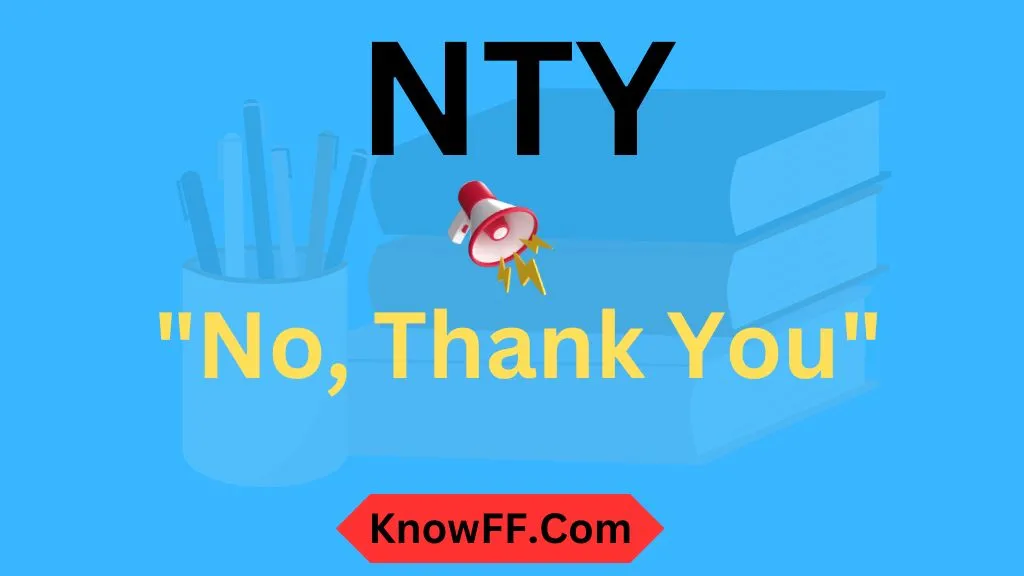In the era of instant messaging and online communication, abbreviations and acronyms have become an essential part of digital conversations.
One such abbreviation that often appears in chats and social media posts is NTY. If you’ve come across this term and wondered what it means, you’re not alone. Many people search for “NTY meaning in text” to understand its purpose, context, and how to use it appropriately.
While NTY may seem like a simple abbreviation, its meaning can vary depending on the platform and context. It is primarily used as a polite way to decline an offer or refuse something.
However, like many internet slang terms, it can take on different connotations based on tone and conversation style.
In this article, we’ll explore the meaning, background, usage, misconceptions, and variations of NTY, along with practical ways to respond when encountering it in a conversation.
Meaning & Definition
NTY stands for “No, Thank You.” It is a commonly used abbreviation in digital communication to politely reject an offer, request, or suggestion. The tone of NTY is generally polite and respectful, making it a less aggressive alternative to a blunt “no.”
Examples of NTY in Text Conversations:
- Casual Chat:
- A: “Hey, want to join us for lunch?”
- B: “NTY, I already ate.”
- Online Gaming:
- A: “Want this rare item in the game?”
- B: “NTY, I already have it.”
- Social Media DMs:
- A: “Hey, are you interested in buying my artwork?”
- B: “NTY, but thanks for asking!”
This abbreviation is widely used across different digital platforms due to its concise and polite nature.
Background
The use of NTY in digital communication can be traced back to the rise of internet slang and text-based conversations in the early 2000s. As messaging platforms, chatrooms, and social media grew in popularity, people sought quicker ways to communicate. Abbreviations like LOL (Laugh Out Loud), BRB (Be Right Back), and NTY (No, Thank You) emerged as part of this trend.
Originally, NTY was primarily used in online gaming communities and forums, where users needed quick responses to accept or decline offers, trades, or invitations. Over time, it became popular in casual texting, business conversations, and even social media interactions, making it a versatile abbreviation.
Usage in Different Contexts
Meaning in Chat, WhatsApp, Instagram, and TikTok
In personal messaging apps and social media platforms, NTY is widely used to politely decline an offer or request.
1. WhatsApp & SMS Chats
People use NTY in private conversations to decline invites or suggestions without being rude.
- “NTY, I can’t go out today.”
- “NTY, I don’t like coffee.”
2. Instagram & TikTok Comments
Users comment NTY on posts when rejecting something (e.g., challenges, giveaways, or requests).
- “Join our challenge!” → “NTY, not my thing.”
- “Follow for follow?” → “NTY, but thanks!”
Meaning in Professional Fields (Business, Medical, IT, and Aviation)
While NTY is mostly used in casual conversations, it can also appear in professional environments with different implications.
1. Business & Emails
In formal communication, “No, Thank You” is preferred over NTY. However, some professionals use NTY in internal work chats for quick responses.
- Example: “Do you want to attend this extra meeting?” → “NTY, I have another commitment.”
2. Medical Field
NTY is not a standard abbreviation in medical terminology, but in patient communication, it might be used when rejecting treatments, medications, or procedures.
- “Would you like a flu shot today?” → “NTY, maybe next time.”
3. IT & Customer Support
In IT, NTY is used in chat-based customer service when declining unnecessary upgrades or services.
- “Would you like to add an extended warranty?” → “NTY, I’m good.”
4. Aircraft & Aviation Terminology
NTY is not commonly used in aviation, but pilots or crew members might use it in casual radio conversations or dispatch messages to decline offers or requests.
Common Misconceptions About NTY
Despite its simplicity, NTY can sometimes be misinterpreted. Let’s clear up some common misconceptions:
- NTY is rude – NTY is a polite way to say no. However, if used in a dismissive tone, it may sound impolite.
- NTY is only for texting – While primarily used in digital communication, NTY can also be used in spoken conversation.
- NTY always means rejection – NTY simply declines a specific request but doesn’t mean dislike or disinterest in a person or topic.
- Everyone understands NTY – Not everyone is familiar with internet slang, so some people may need clarification.
Similar Terms & Alternatives
If someone doesn’t want to use NTY, they can choose from several alternatives:
- No Thanks – The full version of NTY.
- I’ll Pass – A more casual rejection.
- Not Interested – More direct than NTY.
- Maybe Later – A softer refusal with openness to future interest.
Each alternative varies in politeness and tone, so choosing the right one depends on the situation.
How to Respond to NTY
If someone replies with NTY, how you respond depends on the context:
- Casual Conversation: “No worries! Let me know if you change your mind.”
- Sales/Business Inquiry: “Alright! If you need more info, feel free to ask.”
- Gaming or Trade Offers: “Cool, just thought I’d ask!”
It’s important to respect someone’s decision without pushing further.
Differences from Similar Words
NTY vs. No Thanks
- “No Thanks” is the full version of NTY and is more widely understood.
NTY vs. IDC (I Don’t Care)
- IDC expresses indifference, while NTY is a polite refusal.
NTY vs. Maybe Later
- “Maybe Later” suggests possible future interest, while NTY is more definitive.
Relevance in Online Conversations & Dating Apps
On Tinder, Bumble, and other dating apps, NTY is used to politely reject unwanted interactions.
- Rejecting a Date Proposal:
- “Would you like to grab coffee?” → “NTY, but I appreciate the invite!”
- Declining a Follow-Up Message:
- “Hey, why no reply?” → “NTY, I’m not interested in continuing this.”
Using NTY in dating apps helps maintain respectful interactions while setting clear boundaries.
FAQs
1. What does NTY mean in texting?
NTY stands for “No, Thank You” and is used to politely decline an offer.
2. Is NTY rude?
No, NTY is generally polite, but tone and context matter.
3. Can NTY be used in professional emails?
Not typically; “No, Thank You” is preferred in formal settings.
4. Is NTY the same as IDC?
No, IDC (I Don’t Care) shows indifference, while NTY is a polite rejection.
5. What is an alternative to NTY?
“No Thanks,” “I’ll Pass,” or “Maybe Later” can be used instead.
6. Does NTY have different meanings in business or IT?
In IT or business chat, NTY still means “No, Thank You.”
7. How should I respond if someone says NTY?
Respect their decision and move on.
Conclusion
The abbreviation NTY (No, Thank You) is a widely used and polite way to decline offers in digital conversations. It appears in texting, social media, gaming, and even professional chats.
While simple, its meaning and tone can vary based on context. Knowing how to use and respond to NTY ensures smooth and respectful communication online.











